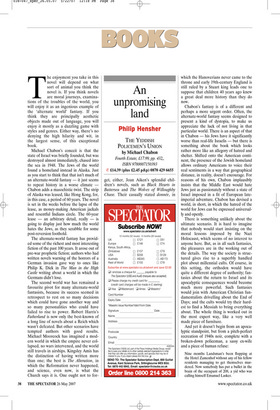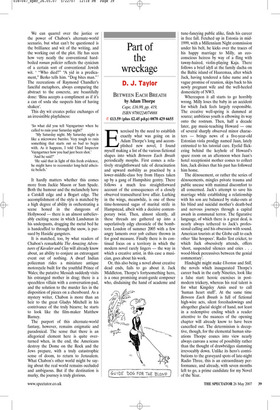An unpromising land
Philip Hensher
THE YIDDISH POLICEMEN’S UNION by Michael Chabon Fourth Estate, £17.99, pp. 432,, ISBN 9780007150393 V £14.39 (plus £2.45 p&p) 0870 429 6655 The enjoyment you take in this novel will depend on what sort of animal you think the novel is. If you think novels are moral journeys, examinations of the troubles of the world, you will enjoy it as an ingenious example of the ‘alternate world’ fantasy. If you think they are principally aesthetic objects made out of language, you will enjoy it mostly as a dazzling game with styles and genres. Either way, there’s no denying the high hilarity and wit, in the largest sense, of this exceptional book.
Michael Chabon’s conceit is that the state of Israel was briefly founded, but was destroyed almost immediately, chased into the sea in 1948. The Jews of the world found a homeland instead in Alaska. Just as you start to think that that isn’t much of an alternate-world fantasy — it just seems to repeat history in a worse climate Chabon adds a masochistic twist. The strip of Alaska was leased, like Hong Kong, for, in this case, a period of 60 years. The novel is set in the weeks before the lapse of the lease, as money-making American jackals and resentful Indians circle. The 60-year lease — an arbitrary detail, really — is going to display just how much the world hates the Jews, as they scrabble for some post-reversion foothold.
The alternate-world fantasy has provided some of the richest and most interesting fiction of the past 100 years. It arose out of pre-war prophetic fiction; authors who had written novels warning of the horrors of a German invasion gave way to ones like Philip K. Dick in The Man in the High Castle writing about a world in which the Germans didn’t lose.
The second world war has remained a favourite pivot for many alternate-world fantasists, because its success seemed in retrospect to rest on so many decisions which could have gone another way and so many personalities who could have failed to rise to power. Robert Harris’s Fatherland is now only the best-known of a long line of novels about a Reich which wasn’t defeated. But other scenarios have tempted authors with good results. Michael Moorcock has imagined a modern world in which the empire never collapsed, no wars intervened, and the world still travels in airships. Kingsley Amis has the distinction of having written more than one; the best is The Alteration, in which the Reformation never happened, and science, even now, is what the Church says it is. One ought not to for get, either, Joan Aiken’s splendid children’s novels, such as Black Hearts in Battersea and The Wolves of Willoughby Chase. Their casually stated donnée, in which the Hanoverians never came to the throne and early 19th-century England is still ruled by a Stuart king leads one to suppose that children 40 years ago knew a great deal more history than they do now.
Chabon’s fantasy is of a different and perhaps a more urgent order. Often, the alternate-world fantasy seems designed to present a kind of dystopia, to make us appreciate the luck of not living in that particular world. There is an aspect of that in Chabon — his Jews have it significantly worse than real-life Israelis — but there is something about the book which looks rather more like an allegory of hatred and shelter. Shifted onto the American continent, the presence of the Jewish homeland allows ordinary Americans to voice their real sentiments in a way that geographical distance, in reality, doesn’t encourage. For reasons of his own, Chabon implausibly insists that the Middle East would hate Jews just as passionately without a state of Israel imposed in a fit of European lateimperial adventure. Chabon has devised a world, in short, in which the hatred of the world for Jews can be expressed universally and openly.
There is something unlikely about the ultimate scenario. It is hard to imagine that nobody would start insisting on the moral lessons imposed by the Nazi Holocaust, which seems of no interest to anyone here. But, as in all such fantasies, the pleasures are in the working out of the details. The way the society is structured gives rise to a superbly handled plot about millennial cults. Of course, in this setting, the orthodox would have quite a different degree of authority; fantasies about the return to Israel and its apocalyptic consequences would become much more powerful. Such fantasies would join with American Christian fundamentalists drivelling about the End of Days; and the cults would try their hardest to find a Messiah to bring everything about. The whole thing is worked out in the most expert way, like a very well made piece of furniture.
And yet it doesn’t begin from an apocalyptic standpoint, but from a pitch-perfect recreation of 1940s noir, complete with a broken-down policeman, a sassy ex-wife and a piece of human refuse:
Nine months Landsman’s been flopping at the Hotel Zamenhof without any of his fellow residents managing to get themselves murdered. Now somebody has put a bullet in the brain of the occupant of 208, a yid who was calling himself Emanuel Lasker.
We can quarrel over the justice or the power of Chabon’s alternate-world scenario, but what can’t be questioned is the brilliance and wit of the writing, and the working out of the plot. He has seen how very neatly the conventional hardboiled roman policier reflects the cynicism of a certain sort of conventional Jewish wit. ‘ “Who died?” “A yid in a predicament,” Berko tells him. “Dog bites man.”’ The recreations of Raymond Chandler’s fanciful metaphors, always comparing the abstract to the concrete, are beautifully done: ‘Bina accepts a compliment as if it’s a can of soda she suspects him of having shaken’.
This dry wit creates police exchanges of an irresistible playfulness:
‘So what did you tell Vayngartner when he called to ruin your Saturday night?’ ‘My Saturday night. My Saturday night is like a microwave burrito. Very tough to ruin something that starts out so bad to begin with. As it happens, I told Chief Inspector Vayngartner how you had just been shot.’ ‘And he said?’ ‘He said that in light of this fresh evidence, he might have to reconsider long-held atheistic beliefs.’
It hardly matters whether this comes more from Jackie Mason or Sam Spade. Both the humour and the melancholy have a Catskill edge and a Bogart edge. The accomplishment of the style is matched by a high degree of ability in orchestrating a scene honed in the dungeons of Hollywood — there is an almost unbelievably exciting scene in which Landsman in his underpants, dragging the metal bed he is handcuffed to through the snow, is pursued by Hasidic gangsters.
It is matched, too, by what readers of Chabon’s remarkable The Amazing Adventures of Kavalier and Clay will already know about, an ability to conjure an extravagant event out of nothing. A dwarf Indian policeman rides a miniature antique motorcycle built for the youthful Prince of Wales; the putative Messiah suddenly visits his estranged mother in drag; there is a speechless villain with a conversation-pad, and the solution to the murder lies in the disposition of pieces on a chessboard. As a mystery writer, Chabon is more than an heir to the great Gladys Mitchell in his contrivance of the truly bizarre; he starts to look like the film-maker Matthew Barney.
The purport of this alternate-world fantasy, however, remains enigmatic and paradoxical. The sense that there is an allegorical element here is quite overturned when, in the end, the Americans destroy the Dome on the Rock and the Jews prepare, with a truly catastrophic sense of doom, to return to Jerusalem. What Chabon’s other world might be saying about the real world remains occluded and ambiguous. But if the destination is murky, the journey is truly glorious.



















































































 Previous page
Previous page